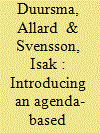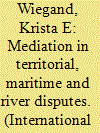| Srl | Item |
| 1 |
ID:
165681


|
|
|
|
|
| Summary/Abstract |
Previous quantitative mediation research has relied on generalized measurements of “mediation success,” such as agreements, ceasefires or peace durability. However, these measurements of success do not take into account what mediators were mandated to achieve. We propose benchmarking outcomes against the explicit mandates of the interventions, a novel way of conceptualizing mediation success. Utilizing data on the agendas of mediated negotiations in intrastate armed conflicts in Africa between 1990 and 2010 as a proxy for mediation mandates, we examine the relative effectiveness of manipulation as a mediation strategy. The study shows, in contrast to previous research, that third party manipulation does not have a significant effect on whether the goal of a given round of negotiations is achieved and, that under some circumstances, may decrease the likelihood of mediation success. We discuss the opportunities as well as limitations of a mandate-based approach to the study of mediation success.
|
|
|
|
|
|
|
|
|
|
|
|
|
|
|
|
| 2 |
ID:
133154


|
|
|
|
|
| Publication |
2014.
|
| Summary/Abstract |
This article seeks to explain factors that make mediation attempts more or less likely in territorial, maritime, and river disputes. I argue that the intensity of the dispute and the salience of disputed territory have strong influence on mediation attempts. The study further examines the impact of these factors on the type of mediation strategy (directive, procedural, or communications). Hypotheses about mediation attempts are tested with the icow data set of interstate territorial, maritime, and river disputes from 1816 to 2001. Findings indicate that intensity of the dispute and salience of disputed territory have a strong impact on the selection of mediation in the first place, and second, that salience of disputed territory makes the directive strategy more likely, while intensity of the dispute makes procedural or communications strategies more likely.
|
|
|
|
|
|
|
|
|
|
|
|
|
|
|
|